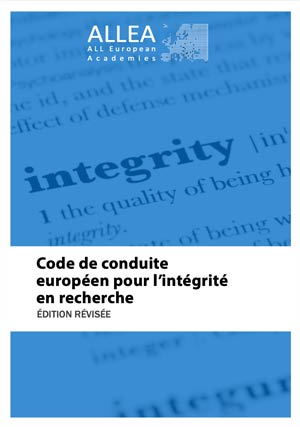Definition
In France, research integrity is now defined in the Research Code (article L. 211-2) as the set of rules and values that must govern research activities in order to guarantee their honest and rigorous nature.
Research integrity is essential to the proper functioning of research communities and is also the fundation of a relationship of trust between the research world and other components of society.
The essential principles of research integrity
Beyond disciplinary diversity, good practices in research are based on common principles, which are explained in the European Code of Conduct for Research Integrity (pdf) :
Reliability in ensuring the quality of research, reflected in the design, the methodology, the analysis and the use of resources.
Respect for colleagues, research participants, society, ecosystems, cultural heritage and the environment.
Honesty in developing, undertaking, reviewing, reporting and communicating research in a transparent, fair, full and unbiased way.
Accountability for the research from idea to publication, for its management and organisation, for training, supervision and mentoring, and for its wider impacts.

Main breaches of scientific integrity
Although there is no legal definition of a breach of scientific integrity in France, it is customary to distinguish between two main types of breaches of good research practice.
Generic scientific fraud, qualified as serious and intentional because it distorts the results of scientific investigation: this is what is commonly referred to by the acronym FFP for data fabrication, data falsification, plagiarism;
Questionable Research Practices (QRP): in this “grey zone”, inappropriate practices that harm the reliability of the results of scientific inquiry and/or the proper functioning of research communities may concern data (deficient archiving or management, retention, omission or selection, problematic statistical processing, image embellishment, etc.) publications (abusive signatures, segmentation of publications or “salami slicing”, self-plagiarism, …), interactions with other researchers (biased peer-reviewing, lack of supervision, …), etc.
A more complete and detailed list of examples of questionable research practices, which is a reference at the European level, is provided by the European Code of Conduct for Research Integrity (pdf).
Please note: acts of moral or sexual harassment, which are subject to specific legal qualifications, do not as such fall within the scope of breaches of research integrity, even if, quite often, these types of acts and research integrity misconducts occur together.

